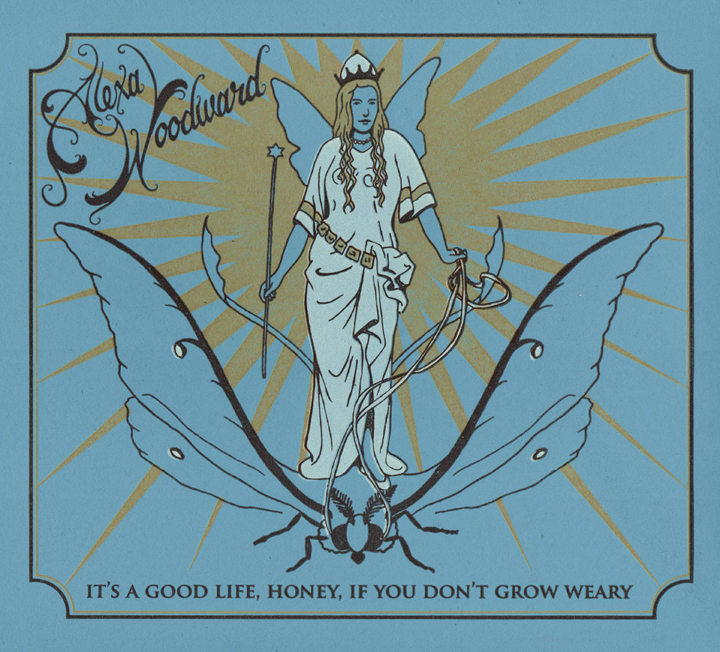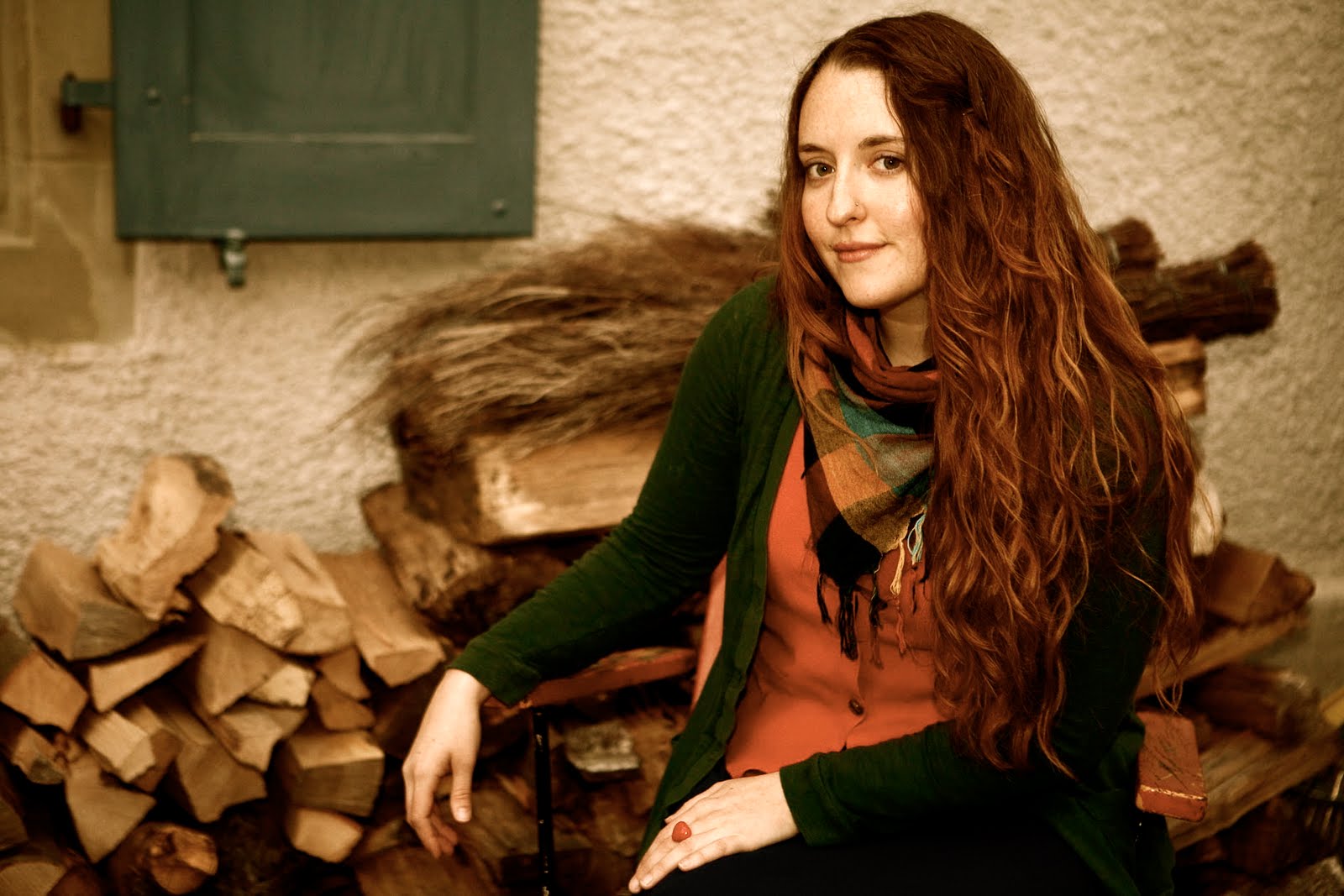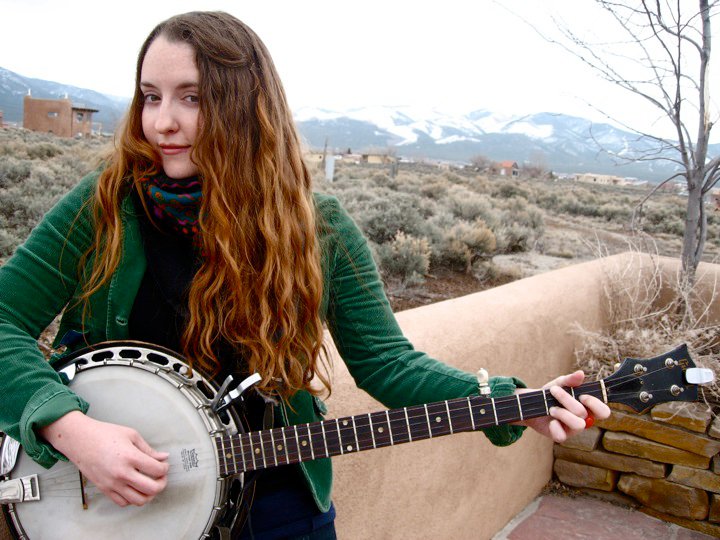
The Lowdown:
May 25, 2011
Alexa Woodward: It's a Good Life, Honey, If You Don't Grow Weary
by Jason D. 'Diesel' Hamad
Alexa Woodward, demonstrating the proper folk singer earth tone attire against a conveniently earthy backdrop. Photo by Claudia Komminoth.
There’s just something I want to like about Alexa Woodward. Maybe it’s the fact that banjo pickin’ chicks are my second biggest musical fetish (behind women bass players… that’s just hot). Maybe it’s because she did a stint in NYC about the same time as I did, although we never ran into each other (which in the city’s gigantic folk geek community is actually kinda surprising). Maybe it’s because she’s an attorney as well as a musician, and I love multitaskers, especially when they take risks (though lawyerin’ is a good fallback in case the whole folk music thing doesn’t bring in the rock-star bucks). Maybe it’s because she loves peppering her social media postings with progressively themed snippets, which given what happened to the Dixie Chicks is pretty brave (even considering most of her fans are good ol’ crazy hippie types). But really I think it comes down to just one thing: the first song I ever heard her do was “Freight Train,” a great old Elizabeth Cotton tune I fell in love with via Peter, Paul and Mary when I was just starting to get into folk. In a genre where reverence for the past is often faked or given lip service at best, you gotta figure anyone who can pull off a classic like that and do it well has just got to be cool. Or it could just be because she’s a redhead.
Woodward’s third album, It’s a Good Life, Honey, If You Don’t Grow Weary (or just Weary, if that leaves you out of breath) is in some ways a throwback. Stripped to its bare elements, it would fit right in during the 60’s folk revival. I could see Alexa opening for Joan Baez in any Greenwich Village club or outdoor festival and standing up just fine. But the music is expanded far beyond the range envisioned by her folk forbearers, with much more complex instrumentation than the old stool-and-a-guitar image of the genre. It’s the best of both worlds: the reverence is there, but at the same time these progressive leaps make the sound fresh and exciting, instead of being just a dust-off of some old relics.
Woodward’s tunes are laid-back and elegant. They are decompression songs rather than tie-one-on songs (unless you’re drinking alone, staring at the .45 in front of you, and trying to think of a reason not to kill yourself). It’s the musical equivalent of the chick-flick foreign film your girlfriend drags you to and you pretend to hate, but which you secretly enjoy so much that you buy a copy and stash it in the back of a closet so she never finds out. Alexa’s voice is warm and vibrant—sometimes sweet, sometimes dark and musky—while her banjo picking is simple, opting for melodic beauty over sheer speed. The music is highly textured but deceptively simple. It is woven together so intricately that it’s easy to get lost in the whole and miss the many layers of instrumentation and vocal harmonies that go into its construction.
It’s hard to select highlights from this album since it is so consistent, but the one that stands out most is “All This Sugar,” a metaphorical anti-greed diatribe set on the backdrop of the BP Gulf oil disaster. The harshness of its lyrics are hidden in its mellow delivery, reminiscent of the way Pete Seeger finds a way to tear a hole through his targets while making them sing along (think “Where Have All the Flowers Gone?” or “Little Boxes”):
Alexa frolics through the urban environment of Bern, Switzerland. She seems like the kind of girl who does a lot of frolicking. Photo by Claudia Komminoth.
Are the ghosts of the rigmen coming to ya in your dreams,
Fingers pointing fingers above a dyin’ sea?
We all know that money is a sword
And you hold your money at the throat of the world
Alexa’s voice stabs its way into her enemies’ hearts even as it sweetly bounces across the plucked banjo background, given weight by deep, resonant vocal and string accents. It even takes a turn for the comical at the end as she slyly winks:
And I bet you don’t have good sex
When your blood’s all full of gold.
Too busy cashin’ checks.
Too busy keepin’ your heart so cold.
All this sugar. All this sweetness.
Ain’t got no bones left. Ain’t got no teeth.
With lyrics like that, it’s quite possibly the best political song since James McMurtry’s “God Bless America.”
A less polarizing highlight is “Pillar of Salt,” a dreamy, sad and haunting musical landscape with hints of progressive bluegrass that is peppered with biblical mythology references. The strongest lines come in a somewhat contrary verse that declares:
I used to hear the preachers preach. I don’t hear them anymore.
I bow before the birds and I sing only for the poor.
Now the tavern is my church. I love the eulogies.
The way the holy spirits flow inside of me.
“O Tornado” is haunting in a more upbeat mode, but no less powerful. Both the music and the lyrics are beautiful, with Woodward’s vocals dancing overtop the instruments. The standout lines are found in a passage that reads:
O tornado, turnin’ turnin’,
Bring us through this longest night.
O tornado the air is gettin’ cold now.
It’s time for you to set their joy on fire.
Sorrowfully you say
People they never change.
You’re wrong, you’re wrong, you’re wrong,
Or so I pray.
Several tracks on this album remind me of Paul Simon’s Graceland in their chanted vocal accents, but the last line of this section evokes Simon in his earlier days, as the melancholic poet dreamer. It’s hard to praise a songwriter any more strongly than that.
“Darkest Days” features some of the fullest music on the album, at some points seeming like a folk wall of sound. This contrasts highly with the short interlude that precedes it, which is a stark a capella rendition of the chorus, just two naked voices set to clapping hands. This rendition wouldn’t raise an eyebrow if some malefactrous archivist slipped it into the Alan Lomax collection at the Library of Congress. Intriguing and graceful in its simplicity, it shows that Woodward understands traditional folk far better than most of her contemporaries, but intentionally decides to go a more original route. As the main track progresses the banjo base is overtaken by cello that drags your heart back and forth with the bow. Lyrically, it contains some of the strongest imagery on an album filled with poetic clarity, such as in the chorus lines:
Banjo in hand on her 2010 tour of the Southwest U.S. And again with a scarf. I feel like she may be one of those "I'm always cold" girls, too. Maybe she frolics so much to keep warm? Aw, hell, I give up.
These are the darkest days, a’ bleedin’ in color.
You are the bluest fire in the memory of another.”
Other notable tracks include “Elephant,” a breakup song of the resigned, reminiscent type. It is starker and simpler than its companions—just Woodward’s melodic voice over a strummed rhythm—but no less beautiful. “Wolves” is perhaps the most unique song on the album, with a sliding electric guitar evoking the howling of the creatures for which it is named. “Down,” reminiscent of Leslie Feist, features a sweet, upbeat chorus accented by syncopated percussion and intricate vocal layering. The closing track, “Weary,” is based on a grandmaism (or a great-grandmaism to be exact), and features some of the most expressive vocals of the collection.
This is the kind of album that grows on you. What may initially appear simple soon reveals its complexities, and what at first may appear dull soon becomes striking. On each successive listen another layer of the complex tapestry embeds itself into the mind, like secrets revealed through some cryptic cipher. It is reminiscent of Paul Simon’s Graceland in one more key aspect: its visionary nature. What Graceland did for folk rock, It’s a Good Life, Honey, If You Don’t Grow Weary may begin to do for folk. In a genre that has too often grown cold under the weight of conformity—either masked as traditionalism or born out of commercialism—Weary is a powerful departure. While few of the songs individually deliver a knockout punch, as a whole this album points Alexa Woodward in a direction where no folk musician has yet to tread. It is simply not to be missed.
| mp3 | cd |
|---|---|








